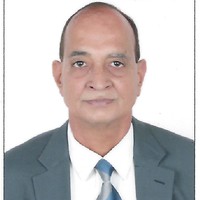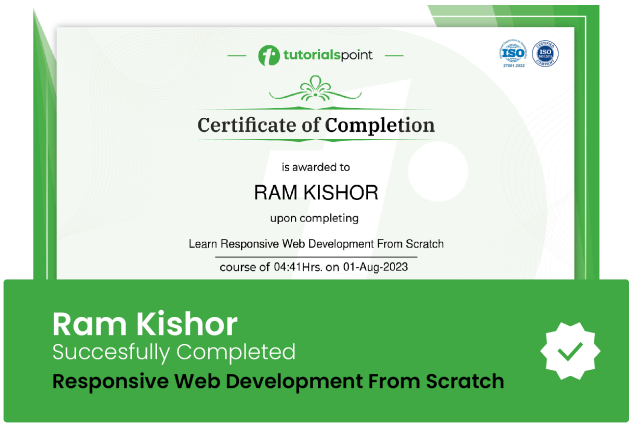Trademark Agents' Qualifying Examination: Part 2
Part 2 of the Preparatory Course for Indian Trademark Agents' Qualifying Examination

Lectures -17
Duration -4.5 hours

30-days Money-Back Guarantee
Get your team access to 10000+ top Tutorials Point courses anytime, anywhere.
Course Description
The professional life of a Trademark Agent essentially revolves around three different types of work. First, of it relates to identifying a good mark after a diligent search and examining the registrability of the mark in the light of statutory provisions. If the mark is already being used by the client in an extensive manner, then apply for registration if it is proposed to be used then conduct a search straight away.
India today figures among the five largest economies of the world. In addition to China, India is going to become an important part of the global supply chain. Hence, the number of trademark registrations will increase in an exponential manner. As of now, trademark registration work constitutes a significant source of Revenue for a Registered Trademark Agent.
Part 1 of this course focused on the different types of trademarks, the process of registration, compliance of formality check, handling oppositions and payment of renewal fee once in 10 years. Additionally, if the client has an international presence, then explore options for foreign registration under the Madrid Protocol. In this first part except for the opposition, there will be no opponent or other side when the Agent pursues registration of the trademark. Hence, the first part of the course focuses exclusively on the trademark registration process.
The second part of the trademark agent work can be described as Compliance Work. During the expected long and infinite life of a trademark, there may be other happenings such as Transmissions and Assignments. Broadly speaking, Transmissions occur due to changes in circumstances. Assignment of the trademark is voluntarily decided by the Registered Proprietor. In respect of Global Trademarks, it will be very difficult for the trademark owner to establish manufacturing and distribution facilities all over the world. The Registered Proprietor will often resort to “Registered Users” who in turn will have many Permitted Users. This part of the work also does not involve any major opposition from third parties. It is mostly a transaction between the Trademark Agent and the Trademark Registry.
The third part of the Trademark Agent work revolves around the enforcement of the registered mark. If the trademark had a higher market presence, and consumer awareness of the brand is high, the trademark owner may choose to monetise the brand for a hefty consideration and may choose to assign the registered mark with or without goodwill. In this work, the enforcement part is taken care of by the lawyers and the monetisation part is handled by managerial professionals.
This course will focus on the essential skills needed by the Trademark Agent in the area of compliance and enforcement.
This course comprises 291 minutes of video. The course has been presented in 4 modules, and each of the lectures is no more than 20 minutes long. The fourth module specifically focuses on international arrangements such as the Paris Convention on the Protection of Industrial Property, the Madrid Treaty on Trademarks, the Nice Agreement on International Classification and the recently concluded Madrid Protocol that provides for international registration of Trademarks. The course is also backed by independent power point presentations which will aid the learners to comprehend the lectures in an easier manner and enable them to effectively apply this information in their professional life.
Normally, while understanding legislation, like the Trademarks Act, the learner will have to focus on
1. Definitions
2. Implementing Authority
3. Procedure for exercise of powers by the implementing agencies
4. Oversight Mechanism by way of Appeals and Revisions
5. Remedies for the person aggrieved by the improper/incorrect implementation of executive powers granted to the authorities/ implementing agencies.
6. Criminal remedies to prevent infringement and punishment of offenders.
The Trademark Act 1999, very clearly identifies the implementing authorities as the Registrar of Trademark. Besides the registrar, the Central Government has also been given powers to aid and assist the Registrar of Trademarks in ensuring the effective implementation of the Act. As pointed out already, prevention of infringement is taken care of by the courts as well as customs authorities operating in Ports of Entry. The Trademark Act provides civil and criminal remedies for the prevention of infringement.
The Trademark Act itself permits the use of an unregistered trademark in the normal course of the trade. The Trademark Agent has to be aware of the fact that registration of a trademark is not a mandatory requirement. Even an unregistered trademark owner can initiate proceedings for the prevention of passing off and unjust enrichment by the infringer. The protection of consumer interest cannot be brushed aside under the carpet by the infringer by claiming that the trademark is not registered and that the mark is incapable of registration under the Trademark Act. At the same time, having a trademark registration is like having a reserved ticket for a proposed long journey that will have to be completed at different points in time. Registration of a trademark is a prima facie proof of ownership of the mark. Registered proprietors can insist that the registration process raises a presumption of the validity of the registered trademark. The registered proprietors have multiple and effective civil, criminal and administrative remedies for the purpose of preventing infringement of the registered trademark. Governments all over the world have tightened the mechanism to prevent indiscriminate infringement of trademarks essentially to protect consumer interest. Under the new Trademark Act the infringer will be made to suffer a minimum mandatory sentence and the profits that they had made by infringement can be disgorged by levy of stiff fine by the Criminal Courts and award of unliquidated damages and exemplary costs by Civil Courts. Additional registration with the Union of India’s Customs Department of the registered mark will enable the registered proprietor to prevent the entry of infringing goods at the Ports of Entry thereby nipping the infringer’s fraudulence right in the bud stage.
Actually, during the previous years, the Trademark Registry had focused more on the:
a. Substantive aspects of trademark registration process
b. Different types of trademarks
c. Absolute and Relative grounds for refusal of trademark registration
d. Major changes brought about by the passing of the Trademarks Act, 1999 and the Trademark Rules, 2002
e. Difference between trademark infringement and passing off cases
f. Rights of unregistered trademark owners
g. Special procedure for Corrective Trademark, Certification Trademark, Associated Trademarks
h. Assignment and Transmission, the procedure for renewal and restoration of abandoned marks.
The learner at the end of the course will be sufficiently educated to recall;
a. Substantive legal provisions
b. Procedural nuances as exemplified in the RULES
c. Determining the applicable official fee, relevant forms, and due diligence for complying with the formality check requirements.
After you complete the course, kindly provide an objective review of the course and suggestions for future improvements.
Goals
What will you learn in this course:
The students will learn
- Assignment and Transmission of Trademarks
- Infringement and Remedies for Infringement
- Trademark Rules
- International Conventions on Trademarks
Prerequisites
What are the prerequisites for this course?
- Graduate Degree in any field
- Preferably completed part 1 of this course series.
This course is designed mainly for:
- Students of Law
- Paralegals in IPR law firms
- Small traders desiring to qualify online vendor registration
- Candidates taking Trademark Qualifying Exam
- Legal and Corporate executives in corporations

Curriculum
Check out the detailed breakdown of what’s inside the course
Module 1
4 Lectures
-
Assignment and Transmission 15:30 15:30
-
Registered User 15:20 15:20
-
Determining an Infringement 19:19 19:19
-
Infringement Continued (Remedies) 15:04 15:04
Module 2
4 Lectures

Module 3
6 Lectures

Module 4
3 Lectures

Instructor Details

Muralidharan R
eCourse Certificate
Use your certificate to make a career change or to advance in your current career.

Our students work
with the Best


































Related Video Courses
View MoreAnnual Membership
Become a valued member of Tutorials Point and enjoy unlimited access to our vast library of top-rated Video Courses
Subscribe now
Online Certifications
Master prominent technologies at full length and become a valued certified professional.
Explore Now


 Updated on Apr, 2024
Updated on Apr, 2024
 Language - English
Language - English